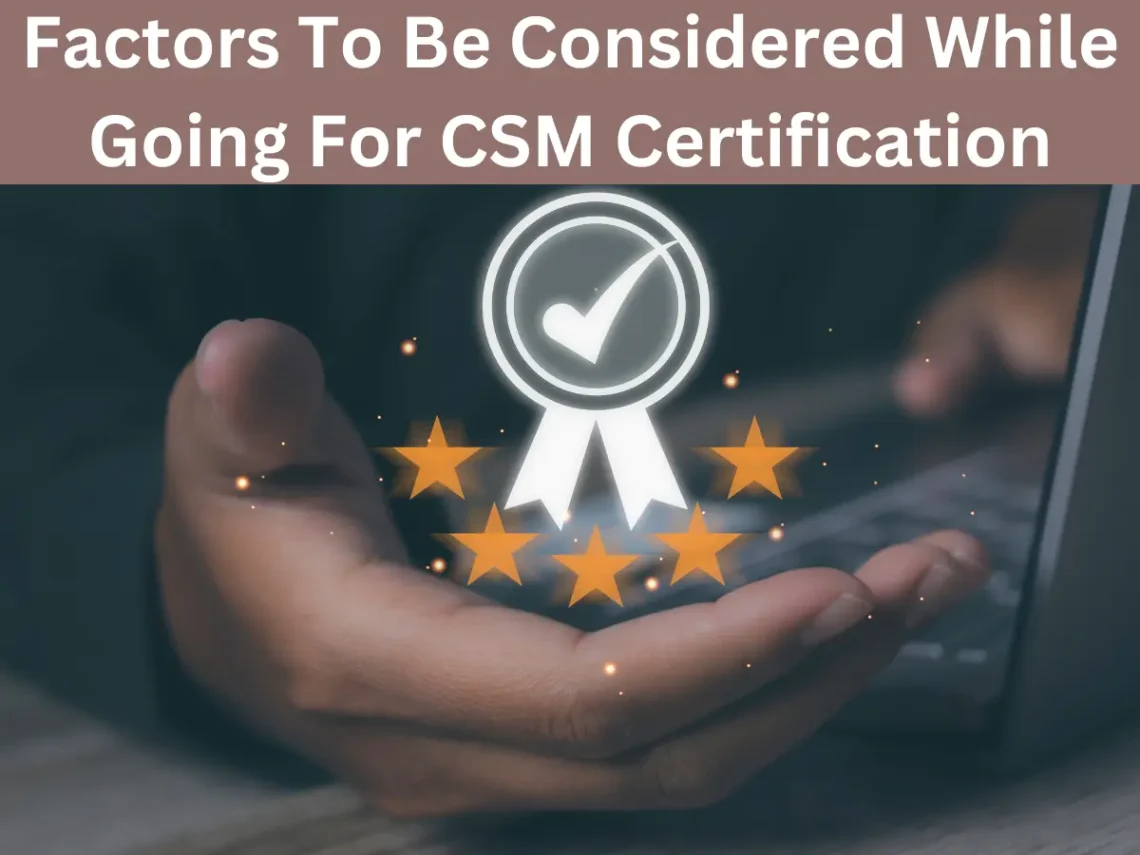
Factors To Be Considered While Going For CSM Certification
Table of Contents
ToggleFactors To Be Considered While Going For CSM Certification
Professionals hoping to be outstanding in Agile project management now highly value Certified Scrum Master (CSM) accreditation. Demand for Scrum Masters has surged as companies use Agile approaches to improve output and simplify procedures more and more. Those seeking CSM Certification in Birmingham or elsewhere must give great thought to several elements if they want the greatest outcomes and return on investment. Before starting the road to become a Certified Scrum Master, this post emphasizes the key factors to take into account.
Understanding the Basics of Scrum and Agile
a. Agile Principles
Agile methodologies prioritize flexibility, collaboration, and customer-centric development. Understanding the Agile Manifesto and its 12 core principles is crucial. These principles emphasize iterative progress, adaptive planning, and early delivery of valuable software. Familiarity with Agile principles ensures a smoother transition into Scrum practices and helps contextualize the role of a ScrumMaster.
b. Scrum Framework
Scrum, a subset of Agile, consists of roles (Scrum Master, Product Owner, Development Team), events (Sprint Planning, Daily Scrum, Sprint Review, Sprint Retrospective), and artifacts (Product Backlog, Sprint Backlog, Increment). Grasping these core components is essential for understanding how Scrum teams operate and deliver projects effectively. A basic knowledge of these concepts allows participants to engage meaningfully in CSM training sessions.
Evaluating Your Career Goals
a. Is CSM Relevant to Your Role?
Professionals in roles such as project managers, product owners, developers, and team leads benefit greatly from CSM certification. It equips them with the skills to foster Agile practices and improve project outcomes. Assess whether the certification complements your current or desired role to ensure it aligns with your career trajectory.
b. Long-Term Aspirations
Consider how the CSM certification fits into your long-term professional objectives. If you’re aiming for leadership positions in Agile environments or aspiring to specialize in Agile project management, the CSM credential can provide a competitive advantage. Aligning the certification with your career aspirations ensures that your investment in time and resources yields meaningful results.
Researching Accredited Training Providers
a. Certification Body
The Scrum Alliance is the governing body that offers the CSM certification. Ensure your chosen training provider is accredited by the Scrum Alliance to guarantee that the certification is legitimate and recognized globally.
b. Trainer Credentials
Certified Scrum Trainers (CSTs) are qualified professionals authorized to conduct CSM training. Investigate the trainer’s background, experience, and teaching style to ensure they can provide real-world insights and practical applications of Scrum concepts.
c. Training Formats
CSM training is available in various formats: in-person workshops, live online classes, and self-paced online courses. Choose a format that suits your learning preferences and schedule. Interactive sessions may provide hands-on experience, while self-paced courses offer flexibility for busy professionals.
Understanding the Cost Involved
a. Course Fees
CSM training costs typically range between $500 and $2,000, depending on the training provider, course format, and location. Understanding the fee structure helps in budgeting for the certification.
b. Additional Costs
Factor in expenses beyond the course fee, such as travel, accommodation (for in-person classes), and the cost of study materials. Although the exam fee is generally included in the course package, confirming this beforehand is important.
c. ROI Analysis
Analyze the return on investment by comparing the certification cost with potential career advancements and salary increments. CSM-certified professionals often command higher salaries, making the certification a worthwhile investment.
Prerequisites for the Certification
a. No Mandatory Prerequisites
The CSM certification has no formal prerequisites, making it accessible to beginners. However, having prior knowledge of Scrum concepts can enhance your learning experience.
b. Recommended Preparation
Reading foundational books like “Scrum: The Art of Doing Twice the Work in Half the Time” by Jeff Sutherland and exploring online Agile resources can provide a solid foundation before attending the training.
Course Content and Structure
a. Key Topics Covered
CSM courses cover the Scrum framework, Agile principles, Scrum roles, and responsibilities. They emphasize the Scrum Master’s role in facilitating Agile teams, managing workflows, and driving project success.
b. Interactive Learning
Many CSM courses offer interactive learning methods such as real-world case studies, group discussions, and simulations. This approach helps participants apply theoretical knowledge to practical scenarios, enhancing retention and understanding.
Exam Format and Preparation
a. Exam Details
The CSM exam consists of 50 multiple-choice questions, with a passing score of 74% (37 correct answers). It is an online, open-book exam that must be completed within a 60-minute timeframe.
b. Preparation Tips
Reviewing course materials, participating in mock exams, and understanding key Scrum concepts are essential for passing the exam. Many providers offer practice tests to help candidates prepare effectively.
Practical Experience and Application
a. Gaining Hands-On Experience
Applying Scrum concepts in real-world projects solidifies your understanding. Seek opportunities to work on Agile projects or volunteer as a Scrum Master to gain practical experience.
b. Networking Opportunities
Engage with Scrum communities and attend Agile meetups to exchange ideas and experiences with other Scrum professionals. This networking can offer valuable insights and career opportunities.
Renewal and Continuing Education
a. Certification Validity
The CSM certification is valid for two years. To renew, you must earn Scrum Education Units (SEUs) and pay a renewal fee.
b. Advanced Certifications
Pursue advanced certifications like the Advanced Certified ScrumMaster (A-CSM) or Certified Scrum Professional-ScrumMaster (CSP-SM) to deepen your Scrum expertise and career potential.
Market Demand and Job Opportunities
a. Growing Demand
The widespread adoption of Agile practices has increased demand for certified Scrum Masters. Industries such as IT, healthcare, finance, and marketing actively seek professionals with Scrum expertise.
b. Diverse Industries
Scrum methodologies are applicable across various industries, providing certified professionals with diverse career opportunities.
Balancing Time and Commitment
a. Course Duration
CSM training typically spans two days. Dedicate time to fully engage in the sessions without distractions to maximize learning.
b. Balancing Work Commitments
Plan your training around work obligations to prevent conflicts. Some providers offer weekend or evening sessions for working professionals.
Soft Skills Development
a. Leadership and Facilitation
As a Scrum Master, leadership and facilitation skills are essential for guiding teams, resolving conflicts, and fostering collaboration.
b. Communication and Collaboration
Strong communication skills are vital for aligning team efforts with project goals and managing stakeholder expectations.
Conclusion
A calculated move towards forward your Agile project management career is seeking CSM Certification in Birmingham. You may maximize the value of your certification by weighing elements like training quality, career rewards, test preparation, and market demand. CSM certification may open fresh prospects, promote professional development, and establish you as a leader in the Agile scene with commitment and the appropriate direction.
You May Also Like

Boost Your CLBPT Score: Comprehensive Practice Tests and Strategies
25 November 2024
Comparing IIT’s Data Science Course with Other Programs
26 February 2025

